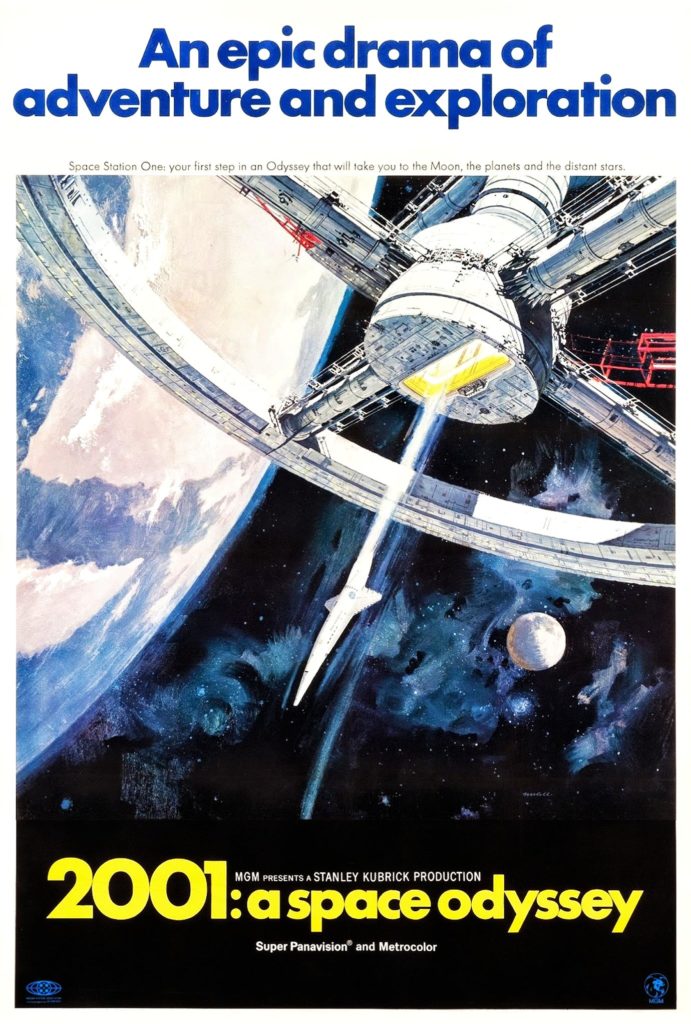If 1967 gave us a breezy caper comedy, 1968 gives us one of the most influential films of the 20th century; Stanley Kubrick and Arthur C. Clark’s masterpiece 2001: A Space Odyssey. Beyond the obvious merits of the film, it has a special place in my life, as this is the first film I actually remember seeing in the theater, when I was but 2 years old. I don’t remember the whole thing of course, but one thing that stands out is my mother and I being perplexed as to why we were seeing some sort of wildlife documentary at the very beginning of the film, and thinking we must be in the wrong theater. Obviously, we weren’t.
Entire books have been written about this film and how it can and should be interpreted, and I won’t even attempt to delve into that heady territory. To be honest, I always thought this film was way more straightforward and easy to understand than its fans and critics claim, and what they come at through hundreds of pages of analysis are to me as clear as crystal.
For me, the importance of this movie is the meticulous presentation of a world that might have been but wasn’t.
This movie, quite intentionally, shows in loving detail a roadmap for the development of a space infrastructure that we as a world arguably could have had by the eponymous date of the film. Space stations with artificial gravity provided by centrifugal force, space planes, shuttles to the moon, moon bases, a growing infrastructure on the moon itself; all of these things would have been quite realistic if we as a nation had built on our commitment to space exploration instead of starving it of funds because a superficial political goal had been achieved.
It’s also important to note that private industry is well-represented in the vision of space that’s presented in the film. Dr. Floyd arrives at the space station on a Pan Am space plane. The station itself has a Howard Johnson’s and a Hilton. But the moon base is shown with no such commercial branding. I think that’s a very deliberate effort to show a formula for space development; government blazes the trail and takes the initial risks, and then private enterprise comes in behind them and turns it into an everyday operation.
Perhaps if the 1960’s and early 1970’s had not been so tumultuous, we might have had our space station and moon base, and the infrastructure to service them, by 2001. But social upheaval, and the Vietnam War, and a lack of political will, gave us nothing but the bloated and hamstrung Space Shuttle program, which took us down a cul-de-sac in terms of space exploration from which we still have not recovered.
To be honest, I do get a little depressed when I see this movie, because it reminds me what we could have had, if not for the lack of vision of politicians.
Honorable mentions for 1968:
- Planet of the Apes
- Chitty Chitty Bang Bang
- The Lion in Winter
- The Producers
- Wild in the Streets










Wow! What a film! What a beautiful, spectacular, perfect film. I was confused by the first Act when I first saw it, but it wasn’t a mystery to me by the end of the film. Reading the novel afterwards cleared up any other mysteries. 2001 certainly stands the test of time, but it is Kubrick, after all.
My additional honourable mentions from 1967:
Butch Cassidy and the Sundance Kid
Easy Rider
The Illustrated Man
Midnight Cowboy
True Grit
The Wild Bunch
and…Gidget Grows Up. Just kidding.
I agree 2001 ASO is great piece of filmmaking. Consider: all of the moon shots and tech was based on speculation–we had NOT landed their prior to production of this film and pretty dead on (which lead to rumors Kubrick helped FAKE moon landing and clues he put in other films, including the Shining where child is wearing a moon landing tee-shirt). I admit I had to read interpretations that dealt with Nietzsche (Wagner score?) and man and tools (our tools kick start rapid evolution, but same tool memes used ie a screwdriver to disable a AI lifeform) to think I was understanding any of this, and also Kubrick or Clarke? stating in the film the final act is Bowmans brain–hes not physically experiencing those images the pure energy evolved life forms are trying to lessen impact of evolution to Ubermensch. Its all up for debate a Rorshach of your own beliefs I get but still a great piece of cinema and agree.